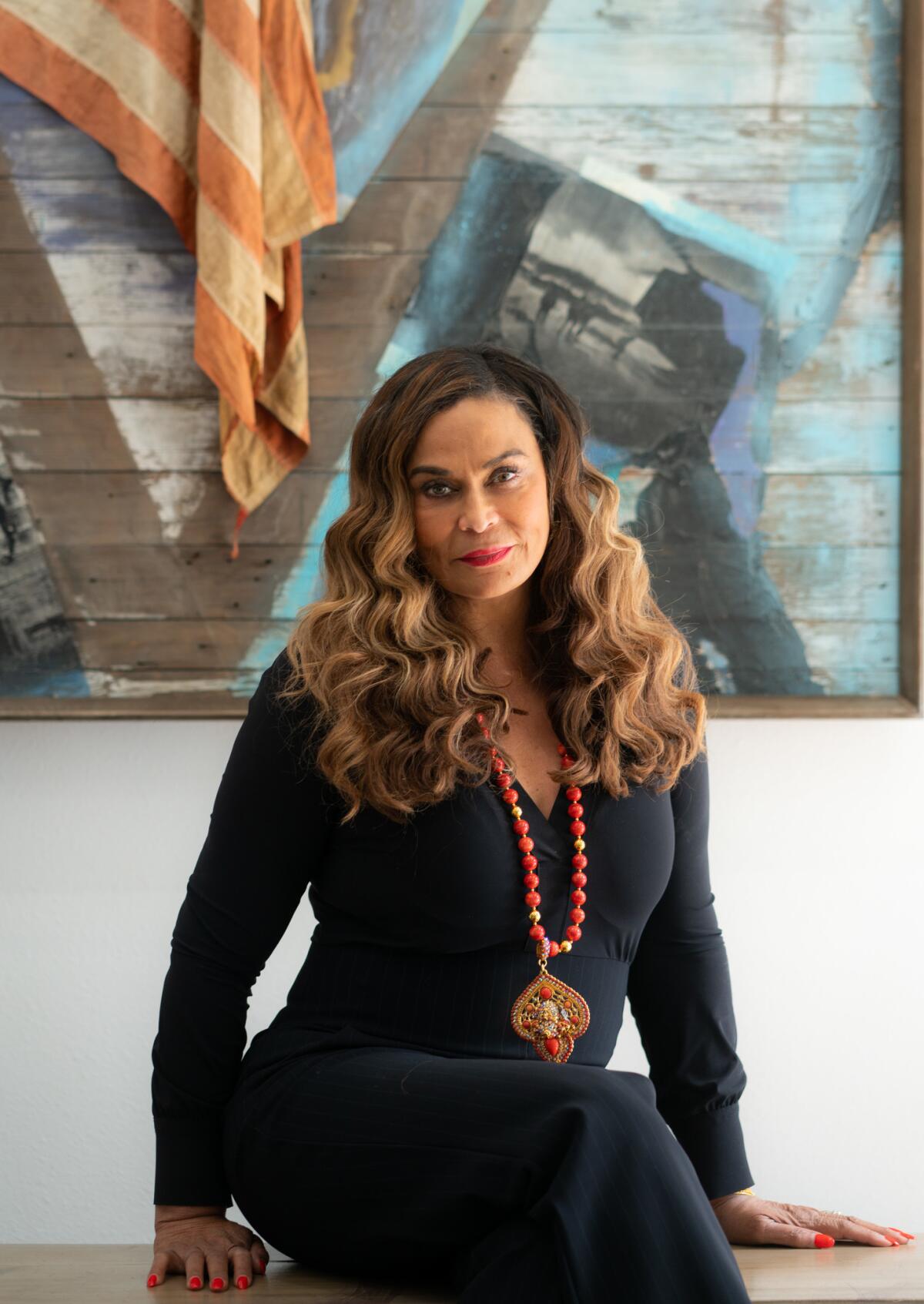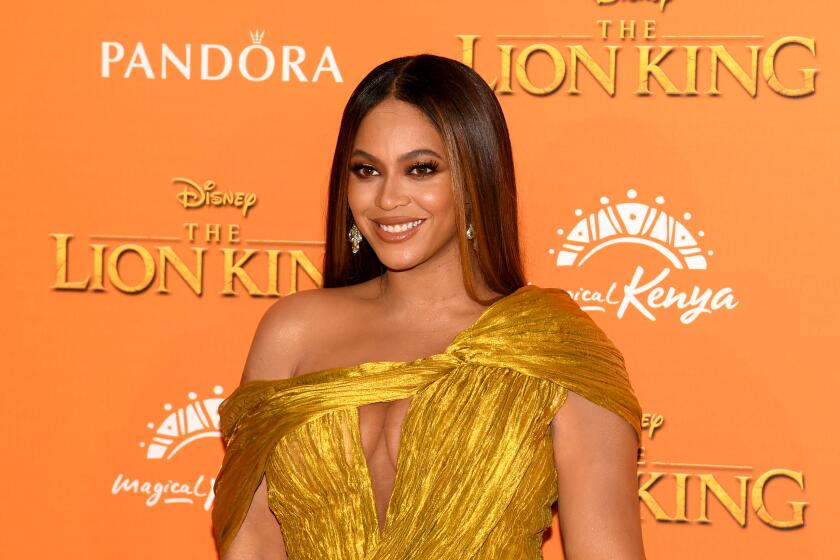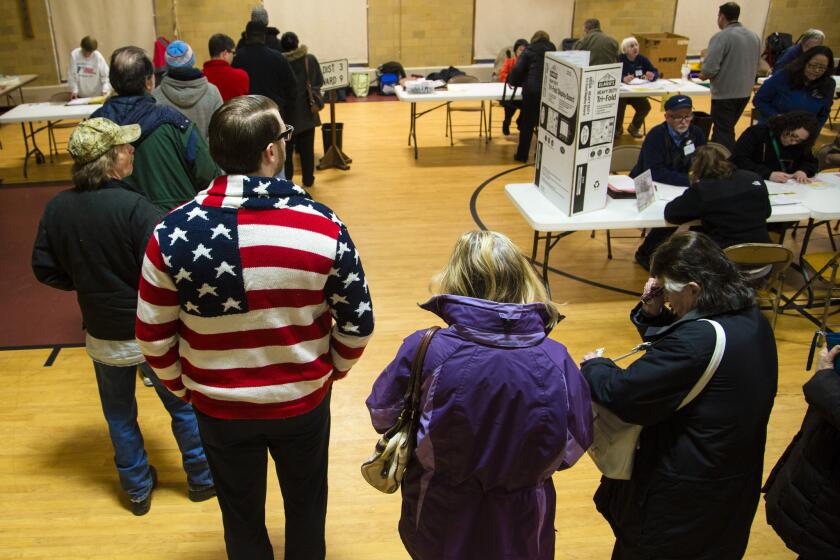Tina Knowles-Lawson and Mothers of the Movement lead charge against voter suppression

- Share via
In an effort to protect the voting rights of Black and brown Americans disproportionately affected by COVID-19, activist Tina Knowles-Lawson has joined forces with her daughters Beyoncé and Solange, other entertainment luminaries and mothers who have lost children to police shootings.
“The Mothers of the Movement are the ones that are most affected,” Knowles-Lawson told the Los Angeles Times on Thursday. “If you have a heart — if you have humanity — and you don’t feel bad for the mothers and the families of these victims ... It pulls on everybody’s heartstrings and gets their attention.”
As part of a Leadership Conference on Civil and Human Rights’ campaign called And Still I Vote, Knowles-Lawson recently penned an open letter to Congress in support of the Health and Economic Recovery Omnibus Emergency Solutions (HEROES) Act, which would “provide a $3 trillion safety net” in funding for “healthcare, economic security, justice system reform, housing and voting access” in communities hit hardest by the pandemic.
“Right now we’re at a crisis moment,” said Leigh Chapman, voting director of the Leadership Conference on Civil and Human Rights. “Election officials are trying to administer elections during a pandemic, but they are under-resourced, and that’s why the HEROES Act is critical, because it provides the urgent funding that they need.”
Among the Mothers of the Movement who signed the letter are Gwen Carr, the mother of Eric Garner; Kadiatou Diallo, mother of Amadou Diallo; Sybrina Fulton, mother of Trayvon Martin; Maria Hamilton, mother of Dontre Hamilton; Wanda Johnson, mother of Oscar Grant; Wanda Cooper Jones, mother of Ahmaud Arbery; Rep. Lucy McBath, D-Ga., mother of Jordan Davis; Geneva Reed-Veal, mother of Sandra Bland; Tamika Palmer, mother of Breonna Taylor; and Shareeduh McGee Tate, the matriarch of George Floyd’s family.
“Our prayer for this letter is that hopefully it’s touching somebody’s heart ... and we shine enough light on it,” Knowles-Lawson said. “And we’re hoping that other people will do the same.”
Others who signed their names include Beyoncé, Solange, Viola Davis, Whoopi Goldberg, Octavia Spencer, Jada Pinkett Smith, Gabrielle Union, Taraji P. Henson, Kelly Rowland, Lala Anthony, Halle Berry, Yvette Nicole Brown, Melina Matsoukas, Janelle Monáe, Bozoma Saint John, Holly Robinson Peete, Oge Egbuonu, Lena Waithe, Kerry Washington and Rashida Jones.
According to Knowles-Lawson, the signatures came together relatively quickly because “everyone with a heart ... wants to do something to help these mothers — to bring them some kind of peace — and voting is one of those things.”
For Breonna Taylor’s mother, Tamika Palmer, having a community of mothers with whom she can relate has been a reminder that she is “not the only person who’s had to deal with this.”
“I have so many people around me, supporting me, who don’t necessarily know how I feel,” Palmer told The Times on Saturday. “So to have these women and all these other people reaching out is amazing and just a relief, because now I know other people that know the pain that I’m feeling and know what I’m dealing with on a day-to-day basis — even with still trying to go to work and stand up for Breonna and still raise Juniyah,” her other daughter.
Maria Hamilton has been pursuing justice for her son, Dontre Hamilton, since he was shot and killed in 2014 by Wisconsin police officer Christopher Manney, who was fired but not charged. “It’s been a long journey,” she said, but “being with this group of women” and talking with the other Mothers of the Movement gives her hope.
“It’s been six years, but it seems like a lifetime,” Hamilton said. “Since Dontre has passed, there are thousands of other mothers out here that don’t know what to do, who don’t have any guidance. And joining up with these women who’ve experienced the same thing that I have ... is powerful.”
She continued: “It’s powerful to know that when I’m thinking of Dontre and thinking of voting and thinking of just having a peaceful life, I turn to them, and I can talk with them, and I can share my concerns. And that’s something that I did not have, the first five or six years of my journey.”
In the letter, addressed to Senate Majority Leader Mitch McConnell (R-Ky.) and Minority Leader Charles E, Schumer (D-N.Y.), Knowles-Lawson outlines several acts of “modern-day voter suppression,” including a lack of polling locations in areas such as Taylor’s hometown of Louisville, Ky., “meager resources” for those processing absentee ballots, faulty voting machines and health risks for those voting in person amid the COVID-19 crisis.
Earlier this week, Louisville opened only a single polling place — the Kentucky Exposition Center — in the entire city for its primary election. Louisville is the state’s largest city, with about 600,000 residents.
“That was ridiculous,” Palmer said. “I understand that there’s a pandemic, but there should have been more than one option for people to be able to go out and vote, and I just feel like they made it harder for people in an effort not to give people their right.”
Wisconsin’s most populous city, Milwaukee, opened just five polling locations in April, as opposed to the usual 180. Despite mailing in her absentee ballot about three weeks before election day, Maria Hamilton said she ultimately found out her ballot was not counted.
“They actually waited until the day before to tell us that we’re only going to have five polling places, and it was really, really upsetting,” she said. “With the coronavirus and everything going on, people had to actually decide, ‘Am I going to put my life on the line and go out there ... to get my vote out?’ or, ‘Will my ballot actually count?’ And it was really just horrible to see people risk their lives.”
“Steps in the right direction are painful reminders that there has still been no justice for Breonna Taylor,” Beyoncé wrote to the Kentucky attorney general.
Published on Thursday, the letter to Congress comes exactly seven years after the Supreme Court’s decision in Shelby County vs. Holder gutted a provision of the 1965 Voting Rights Act that required regions with a history of discrimination to “pre-clear” changes in their election procedures with the U.S. Department of Justice or a federal court.
“The leadership conference is also calling on Congress to restore the Voting Rights Act so we can prevent racial discrimination in voting,” Chapman said. “So we can prevent polling place closures around the country and strict voter ID laws.”
Knowles-Lawson added: “A lot of people, because Black people have been so unheard for so long, they really believe that voting does not make a difference. And so we connect the dots for them. That’s the next step.”
In November, Republican lawmakers could close polling places in Democratic areas and even prevent people from voting directly for the president.
Thursday’s missive also calls on its recipients to “take action and do their part to undo this country’s systemic racism” — a reality that Knowles-Lawson says non-Black communities can no longer ignore after the recent killings of Arbery, Taylor, George Floyd and others.
“We’ve known, in the Black community, what’s going on, because it’s happening to us, and most people have a story about some type of either police brutality or gun violence,” Knowles-Lawson said. “But I think, for the first time, people can’t look away. I think that Black people have finally taken a stand with their white friends and said, ‘Listen, silence is betrayal, and I need you to pull up, and I need you to see this too.’
“And I think once people took a look — other ethnicities took a look — if you have any type of humanity, then you can’t look away anymore. ... People have to examine their hearts and their souls and really take a good look in the mirror.”
More to Read
The biggest entertainment stories
Get our big stories about Hollywood, film, television, music, arts, culture and more right in your inbox as soon as they publish.
You may occasionally receive promotional content from the Los Angeles Times.













